What is a Crypto Wallet? The Ultimate Guide 2023
What is a crypto wallet? What ways to store digital currencies, and which one is most suitable for you? Learn in our comprehensive web3 guide.

What is a crypto wallet? What ways to store digital currencies, and which one is most suitable for you? Learn in our comprehensive web3 guide.
Introduction
Crypto Wallets Vs Exchanges: Where Is It Better to Store Your Crypto?
What is the difference between a crypto wallet and an exchange wallet?
• Custodial wallet: The type of wallet that is used by crypto exchanges
• Non-custodial wallet: Personal wallet for which you have the sole responsibility
Why does it matter where I store my crypto?
Crypto wallets vs exchanges: Why use an exchange for storage?
• Pros of storing your crypto in an exchange
• Cons of keeping your crypto in an exchange
Why might a personal crypto wallet be better than an exchange?
• Pros of storing your crypto in a personal crypto wallet
• Cons of keeping your crypto in a personal crypto wallet
Personal wallets vs exchange wallets: Which comes out on top?
Hot or cold wallet
Hardware wallet
Which crypto hardware wallet should I choose?
• Trezor Wallet - Trezor Model One
• Ledger Wallet - Ledger Nano S
• KeepKey Wallet
What else should you look for in a multiple cryptocurrency hardware wallet?
Bonus tips to protect your funds in a crypto wallet with multiple currencies
Software wallet
• Exodus Wallet
• Guarda Wallet
• MetaMask Wallet
How to download and set up the MetaMask Wallet?
What type of crypto wallet to choose?
Crypto wallet for Beginner investors
Crypto wallet for Advanced investors
Conclusion
The crypto world can also be dangerous - malicious individuals are lurking everywhere, and their main target is investors' virtual currencies. And they have plenty of strategies to steal the funds of their potential victims. Therefore, creating a plan to protect your digital currencies should be the highest priority.
Overall, there is a wide range of storage options, each with its trade-offs in security and usability. Most often, those new to the crypto world stick to exchanges, as for many, they provide their first exposure to cryptocurrency and allow users to store their funds in an online wallet. However, in this case, the user is technically not in control of their coins. Therefore, if the exchange is hacked or taken offline, they may be unable to recover their funds.
Users may not see the need to move their cryptocurrency off-exchange. They may lack the skills to do so or even feel their funds are more secure there. After all, self-storage can also lead to the loss of funds if the user makes a mistake.
"Not your key, not your crypto."
The thought of taking control of your cryptocurrency yourself can be intimidating. However, from a security point of view, hardware wallets are unmatched. These portable devices, the size of a flash drive, give secure access to your cryptocurrency. They generate the user's private keys in a safe offline environment while featuring an easy-to-use display. They usually connect via USB or Bluetooth to Internet-connected devices, such as your computer. A separate wallet screen is used to verify and approve transactions to prevent the disclosure of sensitive information on the internet-connected device. This is very convenient as you don't have to worry about your computer being compromised.
Hardware wallets are an investment, but it's worth it for the peace of mind you'll get from them. They'll keep you safe when you're making transactions, but you'll still need to keep backups of your keys.
Let's dive in further and get crypto wallets explained.
Crypto Wallets Vs Exchanges: What is the Best Way to Store Your Crypto?
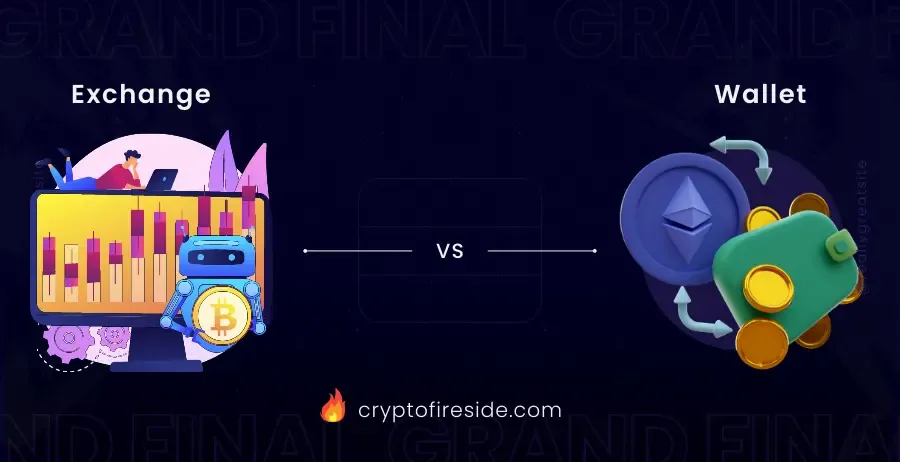
Where you store your crypto will have an impact on almost every aspect of your experience as a crypto holder. In the following part of the article, we'll explore the key differences between a crypto wallet vs an exchange to help you understand which crypto storage option is right for you.
If you're like most people, you probably won't trust most places to hold your USD besides a bank, so why trust any wallet with your crypto?
In 2022, over 3 500 000 000 USD in crypto was stolen. Yes, that's billions. As a result, security is a growing concern with crypto wallets, along with other factors like high transfer fees between wallets and losses from simply losing wallet keys.
What is the difference between a crypto wallet and an exchange wallet?
This is one of the fundamentals of crypto investing. Anyone who wants to or is already involved in crypto investments should know the wallet options. A crypto wallet is exactly what you hear - a place to store your virtual currencies. Unlike physical, however, it contains private keys, letters, and numbers representing the cryptocurrency you own on a given token's network. Private keys allow you to send and receive crypto and transfer cryptocurrency between wallets.
A passphrase protects your web3 wallet. Usually, 12 to 24 random words you must remember if you want to regain access to your cryptocurrency. You can (and should) write down your opening phrase and keep it in a safe place. As a general rule, you should not share your passphrase with anyone under any circumstances - the passphrase is the key to your wallet and cryptocurrency, and sharing it would be like giving away your bank account details.
You can choose from several types of wallets, including custodial and non-custodial. The difference between them is who controls the tokens stored: the user or the platform that offers them.
Custodial wallet: The type of wallet that is used by crypto exchanges
Crypto exchanges can store your coins on your behalf. You give up an element of control over your money in exchange for the ability to store many coins in one place and trade them freely.
When you deposit on an exchange, you also shift a huge portion of the responsibility to the platform. So, for example, if you are hacked, and it is not your fault, some exchanges could compensate for your losses.
However, you don't own the crypto on an exchange. Instead, any coins you leave can be converted to liquidity or investment for them to facilitate trades. And while some exchanges promise compensation for losses, often, this is little more than a handshake agreement.
Non-custodial wallet: Personal wallet for which you have the sole responsibility
A personal crypto wallet, on the other hand, gives you complete control of your crypto. You can store your crypto on hardware or software and become your own bank. There is no need for a middleman. You have complete control over your tokens and coins, as well as the private keys that prove those tokens and coins are yours.
With these non-custodial wallets, you are responsible for the safety and security of your funds. This means it requires more work on your part to make sure you connect your wallet to an exchange or dApp for trading.
All non-custodial crypto wallets are anonymous.
Why does it matter where I store my crypto?
Where you store your crypto has an impact on the following:
- How easily you can access your funds.
- What happens if you lose your wallet key.
- How many people are involved, and who do you trust with your private information.
- What security measures and insurance are in place should you fall victim to hackers or cyber theft.
- How much research do you need to do before you can feel confident storing your crypto.
In the next section, we'll outline some of the key benefits and limitations of storing your crypto in a crypto wallet vs on an exchange.
Crypto wallets vs exchanges: Why use an exchange for storage?
A cryptocurrency exchange allows you to trade cryptocurrencies for other cryptos in one place. When you invest in crypto using an exchange, you can create an exchange wallet to store your coins.
In 2021, the most popular exchange platforms were Binance, Coinbase, BlockFi, Gemini, and FTX. Out of these 5 in 2023, only the first two are still active and going strong. BlockFi has filed for bankruptcy. Gemini has some significant issues and could also go under. And FTX, with their CEO Sam Bankman-Fried has notoriously scammed their users.
Pros of storing your crypto on an exchange
- They are a popular choice because they don't require much maintenance or work from the user.
- Some exchange platforms have an insurance policy that protects your crypto against cyber-attacks. If your crypto is stolen and it was not your fault, you may be entitled to compensation from the platform.
- As long as you have your wallet code, you can easily access your crypto from any online computer. No hardware is required to access your funds.
- If you lose your wallet code to a personal wallet, there is no chance of recovery. In exchange, there are steps you can take to recover your account.
- When you store your coins on an exchange, you can easily trade your crypto with other currencies on the exchange without paying pricey gas and transfer fees.
Cons of storing your crypto on an exchange
- You don't own your crypto when you store your coins on an exchange. If the platform goes bust, you will likely lose most of your assets. You could have to wait for years in order to get something back.
- Storing your crypto on an exchange requires a great deal of trust. Some exchange employees have access to your private keys, and although extremely unlikely, there is the possibility a rogue employee might run off with your data and crypto.
- You are not in charge of your money. Exchanges follow their own laws and regulations. This means the terms of your storage could change at any time, and there is nothing you can do about it.
Why might a personal crypto wallet be better than an exchange?
The most popular alternative to storing your crypto in an exchange wallet is holding it in a personal crypto wallet. Hot wallets enable you to keep your crypto online, whereas cold wallets allow you to store your crypto offline via hardware. Either way, you own your crypto.
Pros of storing your crypto in a personal crypto wallet
- When you store your coins in a personal wallet, you are in control of your crypto. You do not have to trust anyone with any of your information. There is no middleman and no trust required. Your crypto is in your hands and your hands only.
- Having more control over your crypto can mean higher security. When you store your crypto offline on a cold wallet, your crypto never goes online. Your crypto is safe from cyber hackers as they would need access to both your private keys AND your physical wallet to access your funds.
Cons of storing your crypto in a personal crypto wallet
- If you lose your passphrase or fall prey to a cyberattack, your crypto is not insured. You and only you are responsible for your crypto, which means you cannot expect compensation from anybody else. There are numerous stories of people who have cold wallets with Bitcoins worth millions for which they have lost and forgotten their passphrases. Sadly, there is nothing they can do.
- If you store your crypto offline in a cold wallet, you need physical access to your device to be able to access your crypto. This means you cannot access your crypto from any computer, and losing your wallet means losing your crypto.
- Personal wallets make earning yield on your crypto a bit more challenging and with fewer options, while still possible.
- You must ensure your connection is disconnected when you're done trading because that also puts you at risk.
Personal wallets vs exchange wallets: Which comes out on top?
Crypto wallets and exchange wallets each have their advantages and disadvantages. Ultimately, your preference comes down to how much control you want over your crypto. DYOR and make a wise decision. Still, the team behind Crypto Fireside would always advise you to store the vast majority of your crypto in a wallet. So let's take a detailed look at more details related to crypto wallets. What other differentiations are there between different blockchain wallets?
Hot or cold wallet
What is the difference between hot and cold storage? The main difference is whether the wallet is connected to the internet or not. In cold storage - which is the safer and more secure of the two types - the wallet is completely disconnected from the internet and requires the user to plug in a USB drive to approve their transaction. Hardware wallets and some software wallets use cold storage - and are usually non-custodial - so they are seen as a more secure form of crypto wallets.
With hot storage wallets, the wallet is always "connected" to the internet. This makes them more susceptible to hacks and actions by a counterparty.
The best practice is to have a warm wallet, also called a "burner", with a small amount to meet your daily needs, and if you need to fund this wallet, do it from your hardware wallet, which you never use, and you connect it to nothing but use as a safe.
Because exchanges use a hot wallet, their security features are relatively weak compared to more advanced options such as hardware wallets. This is because exchange wallets are subject to the cybersecurity of the exchange they are hosted on. They are still the easiest to set up and access for beginners. These wallets are custodial, so your keys and coins are kept safe from the exchange.
Hardware wallet
A hardware wallet is the most secure way to store digital currencies. Hardware wallets like those produced by Trezor and Ledger are physical cold storage devices with private keys. They are not a custodial type of wallet and are best for intermediate crypto investors, but beginners can also benefit from them.
They may look like flash drives, but they are protected with a PIN code required to access the information, as well as an optional password. PIN and password are not the only safety measures for these wallets. If a hacker can gain access to a hardware wallet, they will need the passphrase to access your cryptocurrency. Since your passphrase is known only to you, it would be impossible for a hacker to guess or hack it. Of course, there are still phishing attacks, so if you're inexperienced enough to enter your words in the wrong place or store them as a backup in some cloud, don't think they've hacked your wallet - you've just given them a gift.
The starting price of a hardware wallet is $65 for Trezor and $60 for Ledger, making them quite affordable.
Which crypto hardware wallet should I choose?
When looking for a hardware wallet, users should educate themselves about the range of options available. There are a number of devices on the market, each with its own slight differences, cryptocurrencies supported, and level of familiarity and understanding. If you are looking for a place to keep your cryptocurrencies safe, then some of the best crypto hardware wallets to choose from are: Ledger, Trezor, Ngrave, BitBox, KeepKey, Cobo Vault, and Keevo.
It is recommended to always buy hardware wallets directly from the manufacturer or official distributors. Buying second-hand carries a serious risk of compromising private keys.
Trezor Wallet - Trezor Model One
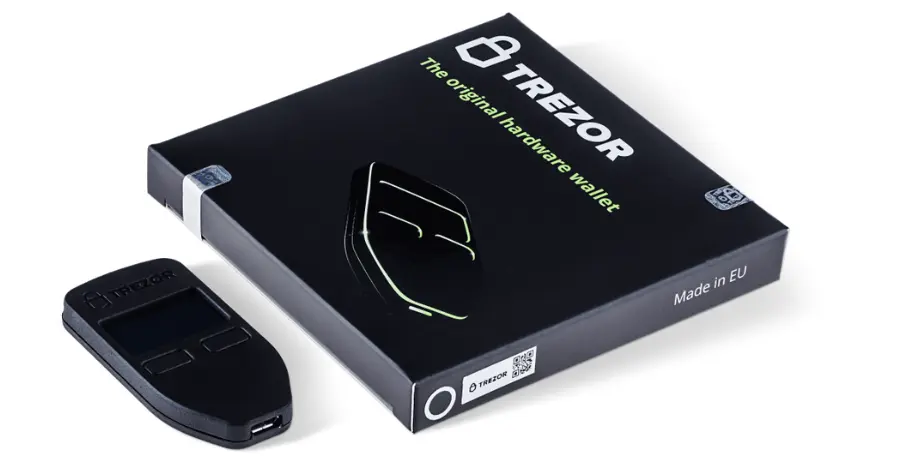
SatoshiLabs' Trezor One paved the way for the ever-growing hardware wallet industry. First launched in 2014, the original cryptocurrency "vault" solution continues to be widely used today - despite the emergence of more modern alternatives.
For users who like a balance between security and practicality, Trezor One's compactness and its compatibility with multiple desktop, mobile, and browser wallets make it a reliable cryptocurrency wallet for everyday use.
In just over six years, Trezor One has solidified its position in cryptocurrency history at an early stage. It may not have some of the features of the second generation of hardware wallets, but what it does, it does well.
SatoshiLabs have excellent performance in the field, and in terms of price, it is one of the cheapest devices on the market. With the abundance of documentation available, the Trezor Model One is an excellent hardware wallet for both beginners and the very experienced with cryptocurrencies. Trezor also offers more expensive options which have additional functionalities or displays.
Ledger Wallet - Ledger Nano S
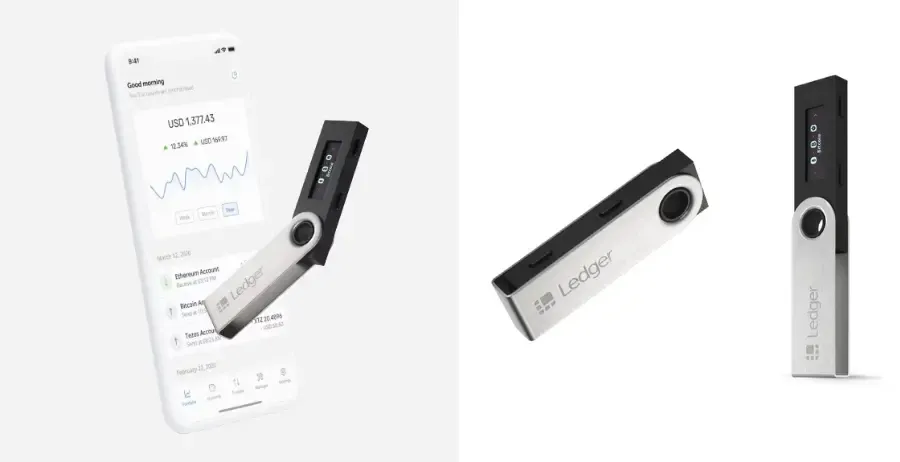
Ledger Nano S is among the most popular hardware wallets on the market. The model offers a high level of security in a classic flash drive-like design.
One of its advantages is that the base model and the high-end Ledger Nano X support the same currencies. This means you can duplicate the information on two wallets or replace your Ledger Nano S with a Nano X bitcoin flash drive afterwards.
Ledger wallets support over 5,000 cryptocurrencies and tokens. Bitcoin, Ethereum, Monero, Litecoin, Polkadot, and more are among them. Most of them are directly compatible with the Ledger Live software.
KeepKey Wallet
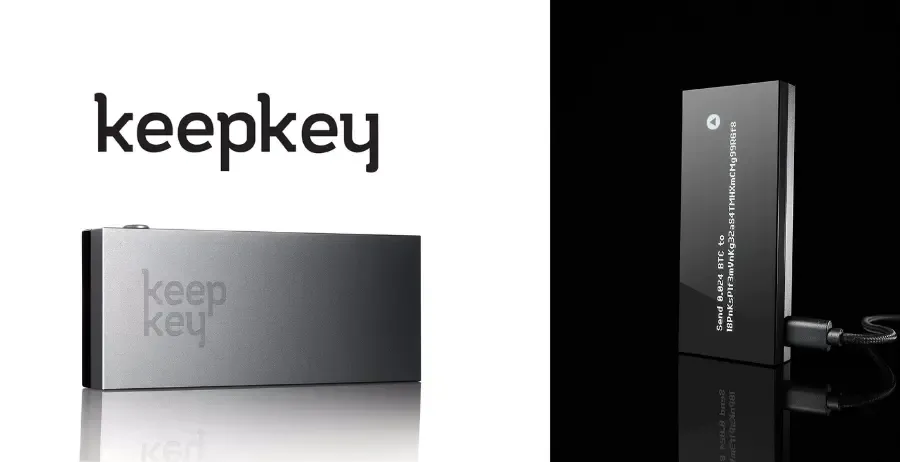
If you're looking for highly-secure long-term storage for your crypto, KeepKey is another good option.
KeepKey is a hardware, multi-crypto wallet where you can store and also exchange crypto thanks to the integrated ShapeShift exchange feature. The wallet supports 50+ cryptos with all popular included. It also holds a wide variety of ERC-20 tokens like Balancer, Binance coin, and DAI.
KeepKey wallet offers simple features. It is an easy-to-use wallet. All you need to do is plug the hardware into your computer's USB port, enter your PIN, and begin sending, receiving, and exchanging crypto.
You can create multiple wallet addresses on one hardware device. Some advantages of having various wallet addresses are:
- They let you separate personal and business transactions
- You can split your crypto between different accounts to enhance safety
KeepKey lacks an Operating System (OS) of its own. It works on any device with Windows, Android, MacOS, and Linux operating systems. Since KeepKey doesn't have an OS, it is immune to viruses, malware, and hacking.
KeepKey provides a 12-word recovery phrase that helps you regain your funds in case you lose or damage your wallet. You can also create a recovery phrase for as long as 18 words.
What else should you look for in a multiple cryptocurrency hardware wallet?
There's no one-size-fits-all wallet. The type of wallet you choose will largely depend on your storage goals. Some common goals include:
- Ease of use – Some crypto wallets have features like keyless login, built-in touchscreens, mobile access, and 24/7 customer care to help with lost funds that make them beginner-friendly. Others have advanced features and are best for seasoned users and those who are good at keeping track of their keys.
- Easy access to your funds – Hot wallets or wallets that require internet access are excellent when you want quick access to your crypto from multiple devices. When you want to store your assets without frequent access, go for cold or offline wallets.
- The ability to swap or exchange funds – Some crypto wallets have storage and exchange features. Choose these if you prefer a platform that also allows you to exchange crypto.
- Reducing fees and other costs – If you are cost-conscious, consider wallets that charge very low or no transaction fees when sending funds and are also free to download and use.
- Earning interest from your crypto – You can choose to gain from your crypto instead of letting it sit idle. Some of the ways you can earn crypto interest include staking proof of stake coins to a native node or contributing to DeFi liquidity pools through your wallet.
Bonus tips to protect your funds in a crypto wallet with multiple currencies
While these best crypto wallets for multiple coins 2023 will help keep many of your cryptos safely in one place, you are only advised to place some of your funds in one wallet.
Different wallets serve different purposes, and if you're like most crypto holders, you'll want to have a mixture of wallets based on what you plan to do with your crypto.
Software wallet
Software wallets are similar to exchange wallets in that they primarily use hot storage. However, they are not exchange-hosted and are non-custodial. To use them, you must connect them to the platform of your choice.
Although all exchange wallets are software, not all software wallets are exchange wallets. Instead, they can also be hosted on a desktop or mobile application not connected to the exchange. Examples include MetaMask, Guarda, and Exodus. Some of them even offer crypto trading.
Exodus Wallet
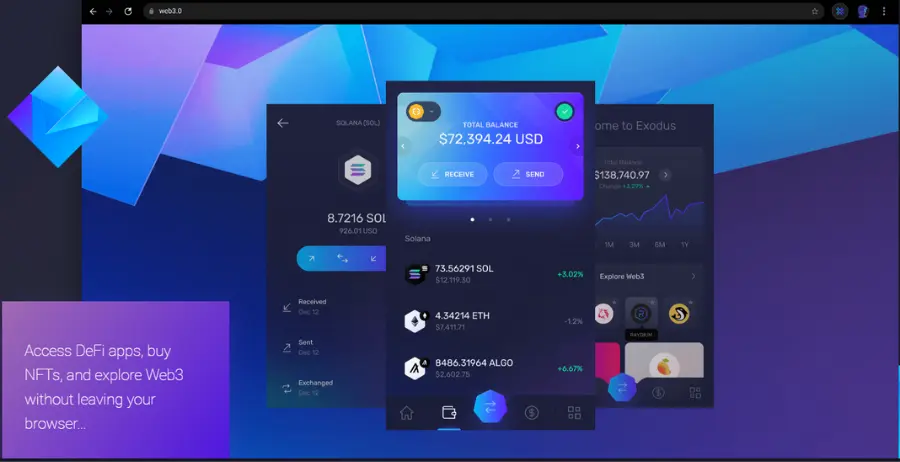
Exodus is one of the most beginner-friendly and long-running wallets. It is not a hardware but a software wallet. It offers 260+ possible assets. Exodus is free to use and also comes with a built-in exchange feature, allowing you to swap between most coins on the platform within the wallet.
Exodus provides an easy-to-read wallet interface where you can compare your crypto assets' value against FIAT currency.
It's easy to recover your crypto with its email restore option. When you create an account, you get a backup link that you can use to recover your account if you lose it.
While Exodus doesn't support 2FA, it's compatible with all Trezor hardware devices so you can manage your assets in a secure hardware wallet.
Guarda Wallet
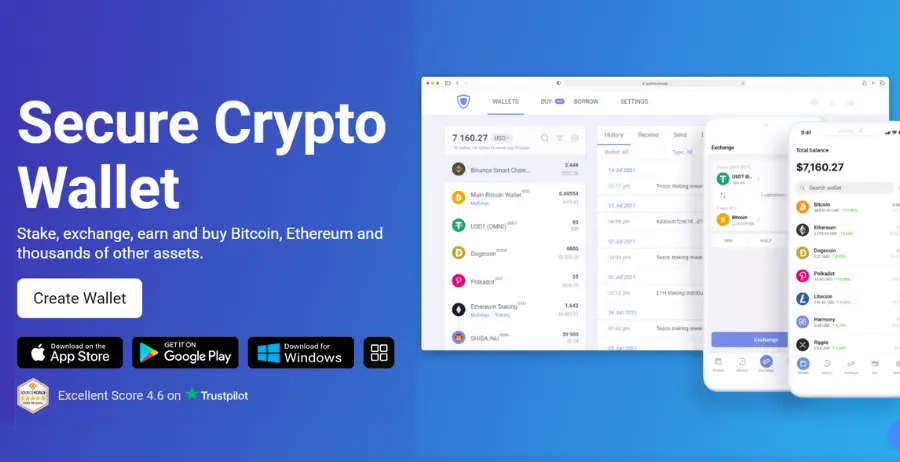
Guarda launched 6 years ago, supporting over 50 blockchains and 400 thousand tokens, including BEP-2 and ERC-20 tokens. It also offers a built-in exchange feature and is a software wallet.
Another benefit of using the Guarda wallet is its responsive, 24-7 live customer support. It offers flexible storage via the web, desktop, and mobile wallets. In addition, it is the first multiple-cryptocurrency wallet to provide support for Multisig security (a system that requires more than one key to authorize a transaction.) A multi-sig security system is perfect if you share a wallet with others, like family members.
Guarda secures your funds by allowing for fingerprint and facial recognition to enhance security on mobile devices. With the help of this blockchain wallet QR code, you can quickly and securely use it. Guarda has open-source software, so you can check for malicious codes that can threaten your funds. It encrypts all of your backup data. You can integrate it with Ledger Nano for more secure hardware storage.
MetaMask Wallet
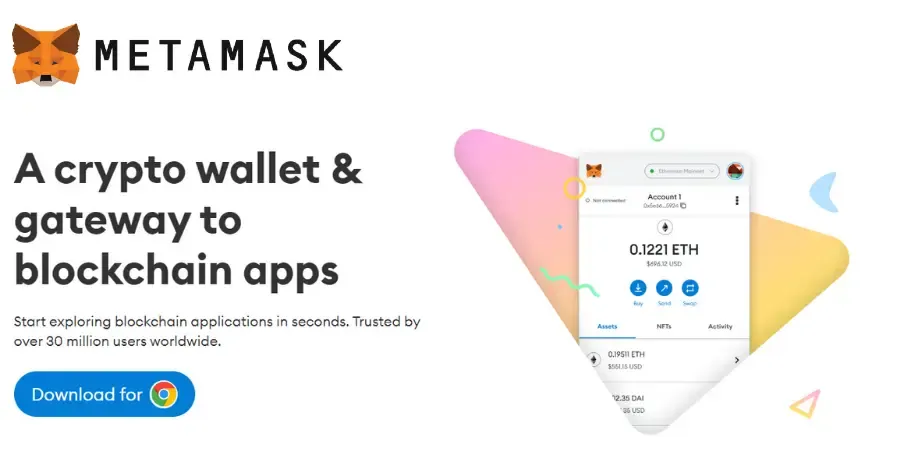
MetaMask is by far the most popular and used crypto wallet. And we don't mean only as a software wallet. If you ask someone who invests in crypto what wallet he/she has used, it is almost sure that they will answer with MetaMask. It is used by over 35 million users all over the world. It is also the best software multi-coin wallet there is.
What makes MetaMask so popular is that it can interact with websites easily. With other wallets, you'll often need to copy-paste payment addresses or scan a QR code on a separate device. With the MetaMask extension, the website simply pings your wallet, and you will be prompted to accept or decline the transaction. And if a website has software wallet integrations, 99.99% of it will have MetaMask.
Available as a browser extension and as a mobile app, MetaMask equips you with a key vault, secure login, token wallet, and token exchange — everything you need to manage your crypto assets.
Before choosing any software wallet, it is essential to consider the types of cryptocurrencies the wallets support. You may also consider how to access the wallet and learn what exchanges it is compatible with to ensure it meets your needs. As mentioned, Metamask is the most used software wallet that supports integrations with almost all web3 pages and projects, all exchanges, and last but not least, it can be connected to a hardware wallet and is extremely easy and pleasant to use.
Step 1: Download the MetaMask wallet
Go to https://metamask.io/ and click "Download". Next, choose your preferred browser or mobile app and install the MetaMask extension. Beware of fake ad sites if you search for the extension in a browser.
Step 2: Install the MetaMask wallet
Click on the MetaMask extension and then click on "Get Started".
Step 3: How to Create a New MetaMask Wallet
Click "Create Wallet", and in the next window, click "I Agree" if you want to help improve MetaMask, or click "No Thanks" to continue.
Step 4: Create a strong password for your wallet
Step 5: Securely store your wallet's opening phrase
Click "Click here to reveal secret words" to reveal the opening phrase.
MetaMask requires you to store your passphrase in a secure location. This is the only way to get your funds back if your device crashes or your browser resets. The most common method is to write your 12-word phrase on a piece of paper and keep it in a safe place where only you can access it. Note: if you lose your passphrase, MetaMask cannot help you recover your wallet, and your funds will be lost forever.
Step 6: Confirmation of the opening phrase
Confirm your secret backup phrase by clicking on each word in the order in which the words were presented on the previous screen. Click "Confirm" to continue.
Congratulations! Your MetaMask wallet has been set up successfully.
You can now access your wallet by clicking on the MetaMask icon in the top right corner of your preferred browser.
What type of crypto wallet to choose?
The type of crypto wallet you should choose depends on your personal preferences. Whether you are new to cryptocurrency and want to get started with your first wallet or are becoming a serious crypto investor and need more security, there is a wallet for everyone!
Crypto Wallets for Beginner Investors
If you choose your first crypto wallet, the easiest way may be to use a custodial wallet, an exchange with warm storage. These wallets usually require a know-your-customer setup where you verify your identity with the exchange. From there, your purchased crypto is stored in the exchange wallet.
This type of wallet is recommended for beginners as it requires little effort to set up and maintenance is the exchange's responsibility. In addition, you can transfer cryptocurrency from the exchange wallet to other wallets if you want or as you progress and learn more as the exchange holds your coins.
Crypto wallet for Advanced investors
Using a software wallet requires some work on the user's part but is usually quite safer, as not all software wallets are linked to an exchange. Wallets like MetaMask and Coinbase wallet are non-custodial, so you have complete control over your crypto and keys. However, they require an internet connection to access, which carries risks.
This type of wallet interface is usually straightforward, and when you are ready to trade on the crypto exchange, you can transfer the desired coins to a separate exchange wallet. The extra work and risk come from the danger of not associating a software wallet with malicious/scam sites that aim to steal your funds. Therefore, hardware wallets are undoubtedly the more secure option.
Conclusion
If you really got this far into the article - WELL DONE! One of the essential things in crypto is really to educate yourself carefully for each topic that interests you. And crypto wallets are an as important a topic in blockchain as it could get... So reading such a long and comprehensive guide definitely gets you on the right track to succeed in the ruthless world of crypto.
Want to Keep Reading?
- How to stay safe from crypto exchange bankruptcies?
- Offshore Crypto Wallet: What the Crypto-Rich Know That You Don't!
- OpenSea Trust Wallet Guide
- What Is Gas in Cryptocurrency? Gas Fees Explained
- Halal Cryptocurrency List: Do's & Don'ts of Islamic Crypto Investing
Want to know how you can support Crypto Fireside?
Sign up below. It's free, it's easy, and it allows you to comment and join the discussion 🔥!
